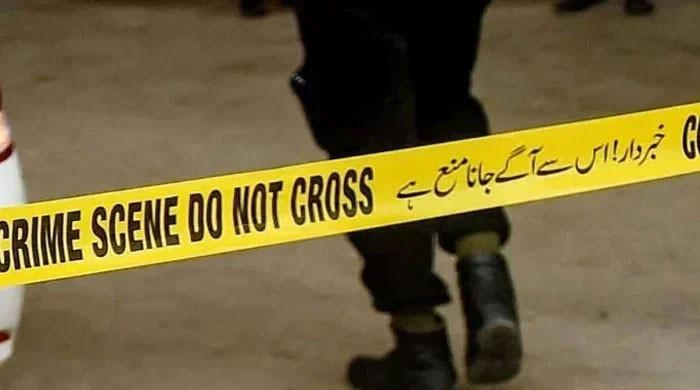Journalists, activists, and politicians condemn Imran Khan's 'derogatory' remarks against Maryam Nawaz
Geo.tv reaches out to women journalists and rights activists to seek their opinions on Imran Khan's statement about Maryam Nawaz
May 21, 2022
While politicians across the country routinely lambast their opponents and rivals and even resort to hurling abuses at each other from time to time, when it comes to criticising female politicians, it has, unfortunately, been a different ball game altogether.
A similar incident was witnessed on May 20 during PTI Chairman Imran Khan's jalsa in Multan, where he — while addressing a charged crowd comprising thousands of people — issued some "sexist and derogatory" remarks against PML-N Vice President Maryam Nawaz.
Khan, referring to Maryam's Sargodha rally on May 19 in which she continually berated him, said: "Someone had sent me the speech delivered by Maryam Nawaz in Sargodha yesterday."
"In that speech, she uttered my name with such passion that I would like to tell her: Maryam, please be careful, your husband may get upset because you were constantly repeating my name."
Following Khan's speech, people from different walks of life, including politicians, took to social media and condemned the PTI chairman's remarks.
To gauge people's reaction, Geo.tv reached out to women journalists and rights activists to seek their input on the matter. Here's what they had to say.
'Reducing women politicians to their sexuality'
"It's clear that his remark was not only sexist, misogynistic, but all sorts of isms apply to his statement," said senior Pakistani journalist Zebunnisa Burki.
"He was addressing a very large jalsa in Multan where he was standing and talking about his political opponent — who is a woman — and he thought it was okay to bring in not just her husband but he insinuated that this woman was hankering after him."
Burki said Khan seems to be suffering from some kind of "delusion" that "any woman who utters his name is pining for him so much so that her husband should feel insecure about it."
"I also think — which is a much deeper issue — that any woman in the public sphere, particularly in politics, is either reduced to her sexuality, or she is pegged as the wife of someone whose honour will be damaged even if she utters some other man's name."
Burki added that Maryam was merely repeating his name because Khan was her political opponent and she was talking about him.
"This was seriously quite disgusting. He should've stuck to criticising her political stance," she said.
'Dangerous trend and a new normal'
Speaking to Geo.tv, journalist Gharidah Farooqi said that targeting female politicians and journalists has been a very "dangerous trend."
"This trend, which was common in the 1990s, has reemerged. Similar campaigns were launched against Shaheed Benazir Bhutto where derogatory terms were used against her," she said.
"But at that time, the traditional media did not have a massive outreach, so the impact on society was minimal. However, with the power of social media these days, a vast majority of the Pakistani population — which comprises the youth — has started readily adopting such language and behaviour against women."
Farooqi, while condemning Khan's statement against Maryam, said that when the younger generation would hear their male leaders use such language against their female opponents, they would normalise it and imitate that in their real lives as well.
"Repeatedly using such filthy language and sexual innuendos against women is highly condemnable," she maintained. "Earlier, people would reject such comments against women but now they have not only normalised it but they have also started defending it, justifying it, and have turned it into a new normal."
She added that all women politicians should be respected and politicians should sit together in the Parliament and formulate a code of conduct to prevent such vices from spreading further.
'Sad, condemnable incident'
According to women's rights activist and organiser of Aurat March's Multan chapter Laiba Zainab, such incidents are sad and condemnable at the same time.
"Unfortunately, we live in a society where people target women even when they want to insult a man," she told Geo.tv. "Women in Pakistan are used to receiving similar remarks from men that Imran Khan used against Maryam Nawaz in the jalsa today."
Zainab said that the "mentality" behind such comments came from the belief that a woman was only respectable as long as she was associated with a man through a relationship — mother, daughter, sister, or wife.
"When seen from a political perspective, these sort of remarks reflect the narrow-mindedness of a person," Zainab said, adding that it wasn't only Imran Khan who issues such disparaging remarks against women but other male politicians do that as well.
'Utterly shameful'
Calling out Khan for his statement, social worker Nayab Gohar Jan told Geo.tv that these types of remarks, especially when they are coming from a former prime minister, are "utterly shameful".
"There are structural barriers present in many professions, and as a result, women are sexualised, harassed, not taken seriously, and are unnecessarily linked to male colleagues," she said.
"It was a very irresponsible statement by the ex-premier as it means that he is normalising this kind of language," she added.
'Not unexpected or surprising'
Condemning the statement made by Khan, journalist, trainer, and Gender Coordinator at the International Federation of Journalists (IFJ), Lubna Jerar Naqvi said that a statement like that from the PTI chairman was "not unexpected and surprising."
"In a patriarchal society where misogyny is prevalent and normalised, these types of statements should not be reinforced."
She said that these types of derogatory attacks on women are common, especially on social media.
Politicians lash out
Taking to Twitter, Prime Minister Shehbaz Sharif, who also happens to be Maryam's paternal uncle, expressed strong disapproval of Imran Khan's statement and said that the entire nation, especially women, should strongly condemn the "deplorable language used against the daughter of the nation Maryam Nawaz."
"Your crimes against the country and the nation cannot be hidden under your lowly humour. How could those — who cannot respect the sanctity of Masjid Nabawi (PBUH) — be expected to respect the honour of someone's mothers, sisters, and daughters?"
'Do not stoop so low in the name of politics'
Censuring Khan for his statement against the PML-N vice president, former president Asif Ali Zardari said that he condemned the derogatory language used by the PTI chairman.
"Those who have mothers and sisters in their homes do not use such language against other women," the PPP co-chairman said. "Please, do not stoop so low in the name of politics."
He added that every person's mother, sister, and daughter was worthy of respect and that was the message of Shaheed Benazir Bhutto to the nation.
"I wish someone would also write a letter to the chief justice of Pakistan based on personal observation and he would take notice of the matter," he said.
'Trying to save mothers, sisters of Pakistan from this evil'
Federal Information Minister Marriyum Aurangzeb, taking to Twitter, also condemned Khan's statement and said that the coalition government was trying to save the mothers and daughters of Pakistan from "this evil."
"These are the same people who want to silence women journalists by calling them sell-outs [when they criticise their parties]," she said.
'Dirty mindset'
Reacting to the incident, PPP leader Sharjeel Memon said: "Imran Niazi’s remarks about Maryam Nawaz are highly condemnable. This shows his training and his dirty mindset."
Civil society expresses disapproval
Women’s Action Forum (WAF), a non-partisan women’s rights group, also "strongly condemned the "crass misogynistic statement made by Khan about Maryam.
"Such statements reflect IK's desperation, his lack of decency, and political inability to conduct a serious debate," the forum said in a statement.
"Sexist remarks and atrocious language reveal a complete lack of respect for women and his narcissism. WAF demands an immediate apology from Imran Khan and calls upon all Pakistani women and men to protest against the shameful remarks."












